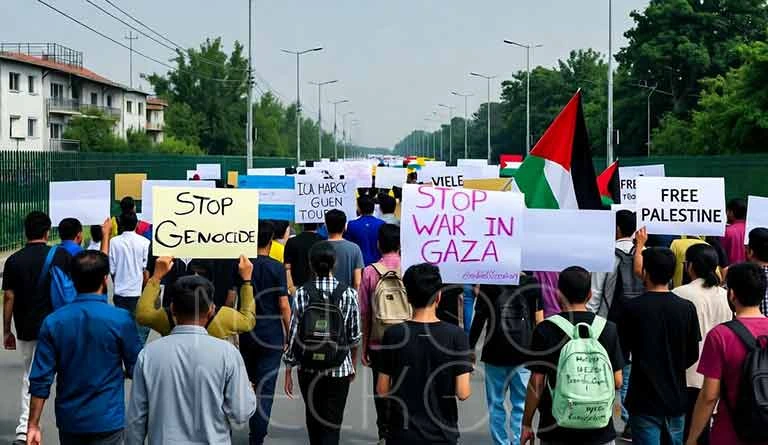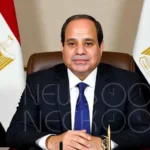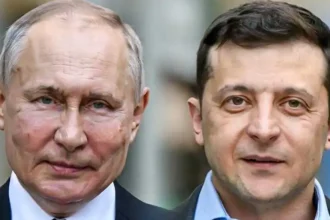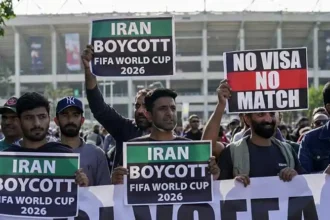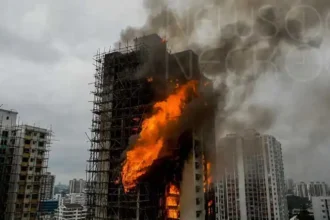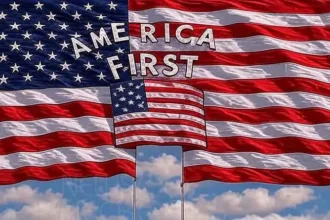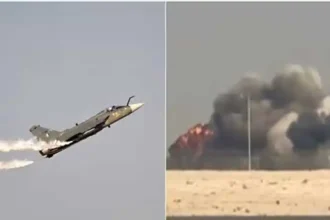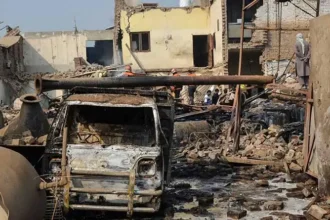A City on Edge: Bloodshed and Tears on the Road to Islamabad
The Grand Trunk Road in Muridke, a usually bustling artery connecting Lahore to Islamabad, became a battlefield this morning. The air was thick not with the usual sounds of commerce and travel, but with tear gas and the chilling echoes of gunfire. A planned protest, a “Gaza March” headed for the US Embassy in Islamabad, ended not in speeches, but in bloodshed.
This was the scene as security forces launched a major operation to stop thousands of supporters of the hardline Islamist group, Tehreek-e-Labbaik Pakistan (TLP). The clash has left a police officer dead, dozens injured, and a nation grappling with yet another internal crisis sparked by regional conflicts. The violence marks a dramatic and tragic escalation of a protest that began with a call for Palestinian solidarity.
The Sound of Gunfire
The conflict reached its peak in the early hours of Monday. As TLP protesters, who had been stalled in Muridke since Saturday night, tried to push toward the capital, they were met with a fierce response from police and paramilitary Rangers.
The human cost was immediate and severe. Station House Officer (SHO) Shehzad Nawaz Jhamat of Sheikhupura’s Factory Area Police Station was killed in the violence. Police officials stated that demonstrators opened fire on authorities, leading to the officer’s death and injuries to several others. Dozens more from both the police and the TLP ranks were wounded in the chaotic clashes.
The TLP, however, tells a story of even greater loss. The group claims that their leader, Hafiz Saad Hussain Rizvi, was shot multiple times and remains in critical condition. They allege that police opened heavy fire on marchers and used tear gas against their central container, which was later set on fire. The party has made staggering claims of hundreds of their workers being killed or injured, though these figures have not been independently verified.
A Government Under Siege
In response to the escalating threat, the state machinery moved swiftly to lock down key cities. The federal government, following the approval of Interior Minister Mohsin Naqvi, ordered the suspension of mobile internet services in Islamabad and Rawalpindi indefinitely, citing heightened security concerns.
Simultaneously, the Punjab government imposed Section 144 across the province for 10 days, banning all gatherings of four or more people in public places. The capital itself was fortified. Heavy containers blocked major entry points, including the vital Faizabad Interchange, effectively sealing off the city’s sensitive Red Zone, where important government buildings and foreign embassies are located. Metro bus services in Lahore and Islamabad were suspended, bringing life in the twin cities to a grinding halt.
The crisis reached the highest levels of government. Prime Minister Shehbaz Sharif held a high-level meeting with Interior Minister Mohsin Naqvi to review the internal security situation. The Prime Minister reaffirmed the government’s commitment to upholding the rule of law and safeguarding public safety, highlighting the seriousness with which the state views this challenge.
The Unyielding March for Palestine
At its heart, this confrontation was triggered by a geopolitical issue. The TLP had launched its “Labbaik Ya Aqsa Million March” from Lahore on October 10. The protest was organized to show solidarity with Palestinians in Gaza and to voice strong opposition against any potential move by Pakistan to recognize Israel.
The TLP is no stranger to street power. The group, known for its hardline religious stance and history of violent protests, gained prominence by campaigning on the single issue of defending the country’s blasphemy laws. Despite being banned in 2021, the group has re-emerged as a potent political force, even securing millions of votes in the 2024 general election.
Before the crackdown, TLP chief Saad Rizvi had released a video urging authorities to cease fire and expressing a willingness to negotiate. He had vowed not to abandon solidarity with Palestine, accusing the government of aligning with Israel. However, with the government standing firm on its decision to halt the march, the path to dialogue was quickly lost in a haze of tear gas and smoke.
You Might Like it: Gaza Ceasefire Brings Hope and Heartbreak
A Nation’s Wound Reopened
The clashes in Muridke are more than just an isolated incident of unrest. They represent a deep and recurring wound in Pakistan’s body politics the collision between religious sentiment, political expression, and state authority.
As the smoke clears over GT Road, the questions linger. The death of a police officer and the critical injury of a political leader create wounds that are not easily healed. The government has restored its control over the highway, but the underlying tensions that fueled this march remain. For a nation already facing immense economic and security challenges, this violent episode is a stark reminder of the fragile peace that exists within its borders. The road to Islamabad is open again, but the path to lasting peace and understanding seems longer and more difficult than ever.
Author: Yasir Khan
Date: 13 Oct, 2025
For More Updates, Visit Newsneck


